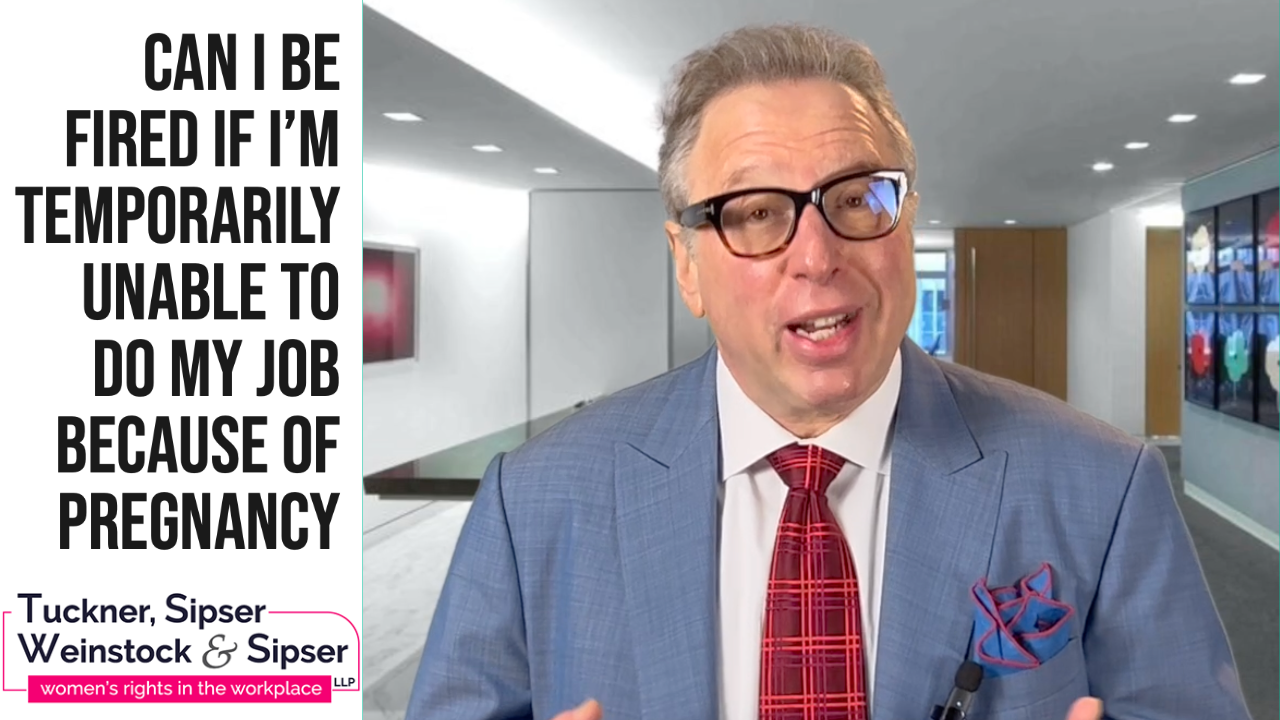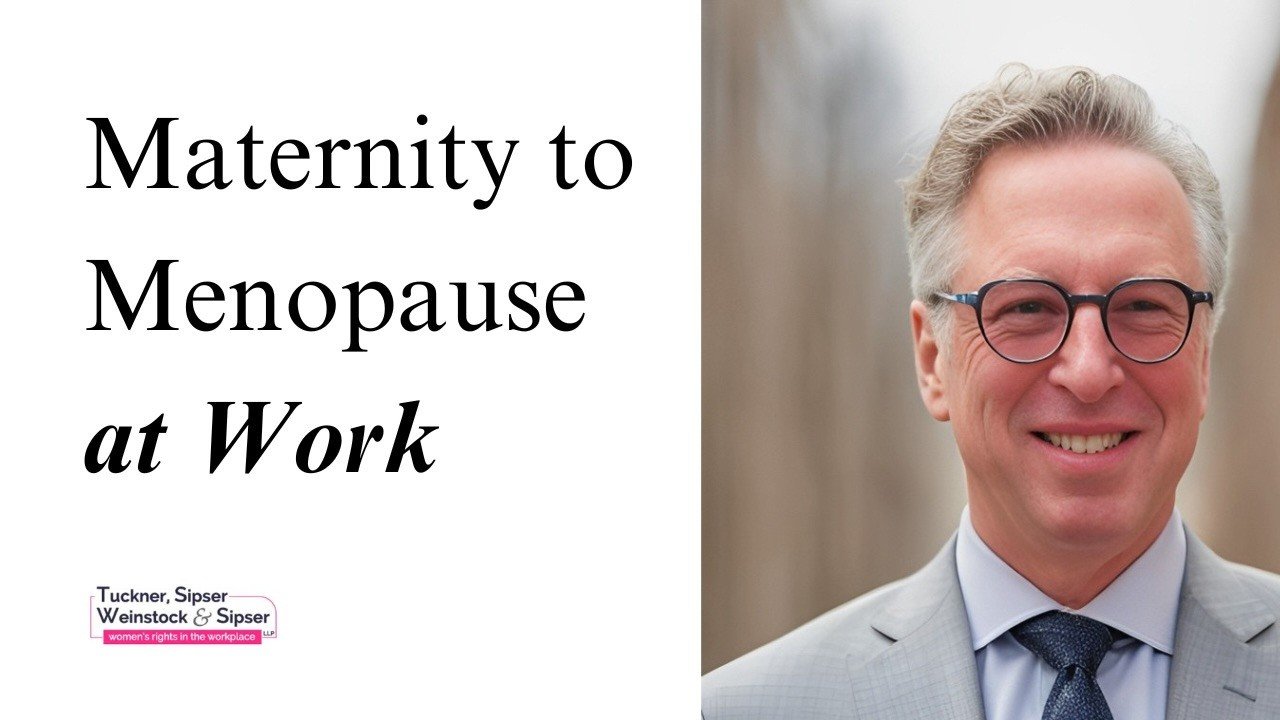Empowering professional women through reproductive stages. Addressing work-life challenges, protections, and guidance.

Jack Tuckner: Leading Advocate for Pregnant Women Amid Tech Industry Layoffs Featured in Fast Company

Can I be fired if I am temporarily unable to do my job because I’m pregnant?
#Pregnancy Discrimination in the workplace is illegal, but it happens all the time. As a #mom, you need to be proactive and understand your pregnancy rights. New York women’s rights attorney Jack Tuckner explains whether it is legal for a pregnant woman to be fired because she is unable to temporarily do her job.

Can your company fail to promote you because you are pregnant?
If your company has failed to promote you because you're pregnant, that's illegal, that's illegal sex discrimination, it's illegal pregnancy discrimination.
Is it illegal to have my baby bump belly touched by coworkers?
There's really no reason to be touching anyone's baby bump in the workplace. And if it continues after you've made it clear that this is unacceptable to you, it is sex discrimination, verging on sexual harassment, so that you should complain to your company, or at least put these concerns in writing so that your company can then put a stop to it.
Texas abortion law, right to choose and right to continued employment while pregnant
The United States Supreme court's recent decision allowing the state of Texas to ban all abortions after six weeks of pregnancy, is a constitutionally invalid, discriminatory law that will greatly affect women and hurt women, particularly poor and minority women, due to the sex-based imposition on them, precluding them from controlling their own bodies.
It's the Best Time Ever to be Pregnant and Working! Find out why!
Under federal law (if you work for an employer with at least 15 employees), you are covered by the Pregnancy Discrimination Act, the Civil Rights Act, which protects you from discrimination based on your sex, which all of course pregnancy-related issues are inseparable from your gender and who you are as a woman.
Your Rights as a Pregnant Employee During the Coronavirus Pandemic
Pregnant employees face a unique set of pregnancy-related stressors as they anticipate giving birth. Many pregnant women understandably experience anxiety regarding job security. Despite federal, state and local governments passing laws that protect pregnant employees, we still have a long way to go before pregnant employees feel entirely safe and empowered in the workplace.
Are you pregnant and suffering severe anxiety during the COVID-19 health crisis?
If you are pregnant and suffering severe anxiety right now about giving birth during this coronavirus (COVID-19) health crisis, your employer must take that into account and be flexible with you due to your current pregnancy-based limitations.
"What I've Learned From My Pregnancy Discrimination Experience" - by Chelsey Glasson
You’ll quickly learn in vetting attorneys that there are many different approaches to fighting pregnancy discrimination legally... I highly recommend checking out Jack Tuckner’s podcast for a more comprehensive overview of your options.
The EEOC Answers Questions on COVID-19, Pregnancy and Your Workplace Rights
The United States Equal Employment Opportunity Commission (“EEOC”) answered questions related to the intersection of COVID-19, pregnancy and the workplace, among other workplace questions.
Candidates Finally Talked About Paid Leave — But They’re Still Missing the Point
Can I Refuse to Travel if I’m Pregnant?
If you’re pregnant, business travel can be difficult, especially if you’re having complications. What are your legal rights and what conversation should you have with your boss?
Does my boss need to let me see my doctor when I’m pregnant?
Does your boss need to allow you time for a doctor’s appointment during the work day? If they don’t, is this discrimination? Can they impose any requirements?
Breastfeeding at Work
Under federal law, since 2010, women returning from maternity leave who are breastfeeding, nursing parents - are entitled to a clean, private, non-restroom, non-bathroom space in which to express milk; to take a break and to lactate on a similar schedule to what your baby would be doing, nursing, if you were home, two or three times a day. Otherwise, it's very painful, you can develop mastitis, it may interfere permanently with your ability to breastfeed, and it’s illegal.
What do you do if you are discriminated against at your workplace?
To treat you equally as a woman, to not permit you to be sexually harassed, to not permit you to be working in an environment that may be hostile to women in general, and you in particular; to ensure that your work environment for the nine months of your pregnancy is flexible, isn’t hostile; that you are able to come back from maternity leave that your employer must provide for you, and they must provide a place for you to express milk after you come back from your maternity leave.
5 ways to be discriminated against based on pregnancy
There are at least five principle ways that you can be discriminated against at work based on your pregnancy.
Pregnancy Discrimination Act Turns 40
This week’s the 40th anniversary of the Pregnancy Discrimination Act - the 1978 federal law designed and enacted to protect women who become pregnant while working, from being fired while pregnant and working.
Your Rosa Parks Moment
If you're going to have your Rosa Parks moment, make it count. Make sure you document, document, document the complaint, and all follow up to the boss, to the HR department. Whatever happens, put it in writing. Hold their feet to the fire. Stand up for yourself. The Rosa Parks moment, Circa 2018 in the workplace.
Every case has a Statute of Limitations
Every case has a statute of limitations - the date by which it must be filed, or the chances are lost forever. In discrimination cases, sexual harassment, pregnancy discrimination, retaliation, any kind of employment law case, a charge of discrimination must be filed with the United States Equal Employment Opportunity Commission before you're allowed to file in court, and that charge of discrimination must be filed, within either 180 days of the last discriminatory act or 300 days of the last discriminatory act, depending on the state where you work. So for instance, in New York, that federal filing date with EEOC is 300 days from, if you were fired, that is likely the last discriminatory act.
Happy July 4th! Paid Maternity Leave Finally a Reality in NY!
Here’s one thing all pregnant working women in the United States now have in every State in the Union, and that’s the right not to be treated differently, not to experience hostility, backlash, a diminution, a degradation to the terms or the conditions or the privileges of your employment because of your pregnancy, because of your childbirth, or because of a related medical condition.

